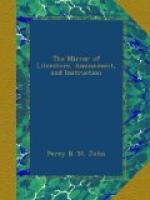“On the morning of St. Barnaby, called the Bright, being the 24th of June, 1314, Edward advanced in full form to the attack of the Scots, whom he found in their position of the preceding evening. The Vanguard of the English, consisting of the archers and bill-men, or lancers, comprehending almost all the infantry of the army, advanced, under the command of the Earls of Gloucester and Hereford, who also had a fine body of men at arms to support their column. All the remainder of the English troops, consisting of nine battles, or separate divisions, were so straitened by the narrowness of the ground, that, to the eye of the Scots, they seemed to form one very large body, gleaming with flashes of armour, and dark with the number of banners which floated over them. Edward himself commanded this tremendous array, and, in order to guard his person, was attended by four hundred chosen men at arms. Immediately around the King waited Sir Aymer de Valence, that Earl of Pembroke who defeated Bruce at Methven Wood, but was now to see a very different day; Sir Giles de Argentine, a Knight of St. John of Jerusalem, who was accounted, for his deeds in Palestine and elsewhere, one of the best Knights that lived; and Sir Ingram Umfraville, an Anglicised Scottishman, also famed for his skill in arms.
“As the Scottish saw the immense display of their enemies rolling towards them like a surging ocean, they were called on to join in an appeal to Heaven against the strength of human foes.—Maurice, the Abbot of Inchaffray, bare-headed and bare-footed, walked along the Scottish line, and conferred his benediction on the soldiers, who knelt to receive it, and to worship the power in whose name it was bestowed.
“During this time the King of England was questioning Umfraville about the purpose of his opponents. “Will they,” said Edward, “abide battle?”—“They assuredly will,” replied Umfraville; “and to engage them with advantage, your Highness were best order a seeming retreat, and draw them out of their strong ground.” Edward rejected this counsel, and observing the Scottish soldiers kneel down, joyfully exclaimed, “They crave mercy.”—“It is from Heaven, not from your Highness,” answered Umfraville: “on that field they will win or die.” The King then commanded the charge to be sounded, and the attack to take place.
“The Earls of Gloucester and Hereford charged the Scots left wing, under Edward Bruce, with their men at arms; but some rivalry between these two great Lords induced them to hurry to the charge with more of emulation than of discretion, and arriving at the shock disordered and out of breath, they were unable to force the deep ranks of the spearmen; many horses were thrown down, and their masters left at the mercy of the enemy. The other three divisions of the Scottish army attacked the mass of the English infantry, who resisted courageously. The English archers, as at the battle of Falkirk, now began to show their




